The Voice of the Voiceless
"If a person is dead, s/he has to have a grave.
Yet, where are my son and his fellow activists who disappeared more than
a decade ago? Without commitment from this government, there would be no
solution to our problems as families of the disappeared! Human rights
violations have first to be resolved by this new Cabinet." Tireless,
Ibu1
Toti Koto2
emphatically questioned the Minister of Justice in Indonesia, Mr.
Patriales Akbar for the government’s lack of progress in the case of the
disappeared and giving an ultimatum to Pres. Sucilo Bambang Yudhoyono (SBY)
(who received a landslide victory as re-elected president of the
Republic of Indonesia) to once and for all, find her son and all
desaparecidos of the country.
"Seeing perpetrators roaming free without qualms, I
feel revolted. If it were not for my faith in God, I would have wanted
to take the law into my hands." Between despair and hope, Jose
Menezes Serrao, a survivor of the April 1999 gruesome massacre in
Liquiçá, Timor Leste, whose neck revealed a deep scar due to hacking,
was furious that despite the realization of the East Timorese people’s
cherished dream for independence, justice remains as elusive as ever. At
least 200 people were murdered at the local Catholic Church, many of
whom were dragged away by the perpetrators and never returned, thus,
prompting the community to build a mock cemetery to preserve the
victims’ memory.
Five long years of searching for disappeared lawyer,
Somchai Neelapaijit of Thailand have brought no resolution to the case
and many other cases of disappearances in the south. The once ordinary
wifeturned human rights defender, Angkhana Neelapaijit continues with
her indefatigable search for her husband and accompanies many family
members of desaparecidos from conflict –ridden Southern Thailand
in their search for truth and justice. One of them was Panya Lausophafan,
whose brother, Kamol, disappeared on 8 February 2008.
Colorfully dressed in Kashmiri saris,3
women from far-flung areas of Kashmir came en masse to
participate in the Forum on the UN Convention For the Protection of All
Persons from Enforced Disappearance (hereinafter referred to as The
Convention) held in Srinagar on 20 December 2009. Etched in their pretty
yet gloomy faces is an unfathomable pain which can only be assuaged by a
revelation of the truth about the fate of their loved ones. Without
words, their very presence spoke eloquently of their unyielding crusade
for truth about their loved ones’ disappearance in order to attain
justice. With their male counterparts, they uniformly wore the APDP hats
designed with a shadow of the desaparecido.
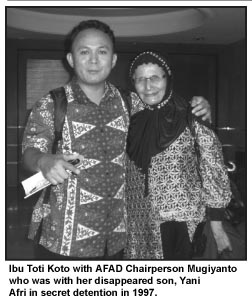 In
the Kathmandu valley of Nepal, families of victims of the ten-year old
conflict organized themselves into a national group, named Committee for
Social Justice Advancing the Rights of Victims. Believing in their
inherent strength developed in the course of their sufferings, this
newly formed group is determined to see a better future for themselves
and for tomorrow’s generations - never forgetting the past, but
remembering those that should never be forgotten. They expressed their
intention to belong to a large aggrupation, i.e. the Asian Federation
Against Involuntary Disappearances (AFAD).
In
the Kathmandu valley of Nepal, families of victims of the ten-year old
conflict organized themselves into a national group, named Committee for
Social Justice Advancing the Rights of Victims. Believing in their
inherent strength developed in the course of their sufferings, this
newly formed group is determined to see a better future for themselves
and for tomorrow’s generations - never forgetting the past, but
remembering those that should never be forgotten. They expressed their
intention to belong to a large aggrupation, i.e. the Asian Federation
Against Involuntary Disappearances (AFAD).
"Please help us, Madam. Our son disappeared. He was
only catching frogs when he was forcibly taken. He did not commit any
crime." Jose and Cleofas Sanchez, an Aeta4
couple from Mabalacat, Pampanga, in their native Kapampangan5,
appealed to Pres. Gloria Macapagal-Arroyo (GMA) to help in finding their
son, Nicolas, who disappeared on 18 September 2006. With tears of
gratitude for having spoken to the highest official of the land and
hopeful that something concrete could be done to find their son, the
couple expressed contentment after the meeting with the Families of
Victims of Involuntary Disappearance (FIND) and AFAD with GMA on 14
January 2010 in Malacanang Palace.
These are a small sample of the voices of families of
the disappeared in the recent Asian campaign and lobby tour which the
AFAD conducted in cooperation with the Latin American Federation of
Associations of Relatives of Disappeared -Detainees (FEDEFAM)
from August 2009-January 2010. For them and because of them and their
beloved desaparecidos, the AFAD’s advocacy has been
conceptualized, is being carried out and is meant to win victories.
The tour was intended to complement the AFAD member-organizations’
efforts in campaigning for signatures and ratifications from Asian
states of the Convention and the enactment of domestic laws codifying
enforced disappearance as a distinct crime.
Marching in Step Toward a Common Direction
The UN Convention has, to date, 18 parties and 81
signatories. This strong international treaty, whose substance stems
from the poignant experiences of families of the disappeared in many
parts of the world, will enter into force thirty days after the 20th
instrument of ratification shall have been deposited in the office of
the UN Secretary-General.
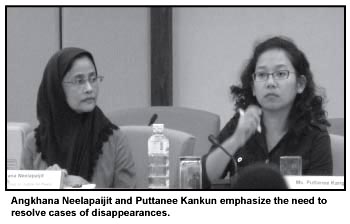 Asia,
the continent that has submitted the highest number of cases to the UN
Working Group on Enforced Disappearances (UNWGEID) in recent years, has
a dismal record of ratifications and signatures. So far, only Japan and
Kazakhstan have ratified and India, Mongolia, Azerbaijan and Laos have
signed. This irony all the more urges members of the AFAD to intensify
its advocacy.
Asia,
the continent that has submitted the highest number of cases to the UN
Working Group on Enforced Disappearances (UNWGEID) in recent years, has
a dismal record of ratifications and signatures. So far, only Japan and
Kazakhstan have ratified and India, Mongolia, Azerbaijan and Laos have
signed. This irony all the more urges members of the AFAD to intensify
its advocacy.
Thus, in a week-long meeting from 25-30 August 2009
held in Quezon City, Philippines, AFAD member-organizations, with the
participation of representatives from Latin America, Euro-Mediterranean
countries and Manila-based organizations, such as the FIND and
Karapatan, charted an urgent strategy for the Convention’s immediate
entry into force for the remaining period of 2009 and the first quarter
of 2010. Culling from the common as well as distinct problem of enforced
disappearances in India, Indonesia, Nepal, Pakistan, Philippines, Sri
Lanka, Thailand, the participants agreed to devise an Asian lobby tour
to support existing activities carried out by the AFAD
member-organizations to pressure their respective governments to accede
to this international treaty and craft enabling mechanisms to ensure
implementation.
Concrete Campaigning and Lobbying
Starting September 2009 and ending January 2010, the
lobby tour was conducted by a team composed of representatives from the
AFAD Council, the AFAD Secretariat, families of the disappeared in
countries visited and a representative from the Latin American
Federation of Associations of Relatives of Disappeared- Detainees (FEDEFAM).
The lobby team spoke with heads of state and representatives of
government agencies, held public events, organized meetings with
families of the disappeared and conducted media interviews in Indonesia,
East Timor, Thailand, India, Nepal and the Philippines. For security
reasons, the planned visits to Pakistan and Sri Lanka did not
materialize.
The first round of tour was done consecutively in
Indonesia, East Timor and Thailand on 17-28 November 2009 resulting in
the physical exhaustion of the lobby team on its 12th day of non-stop
work.
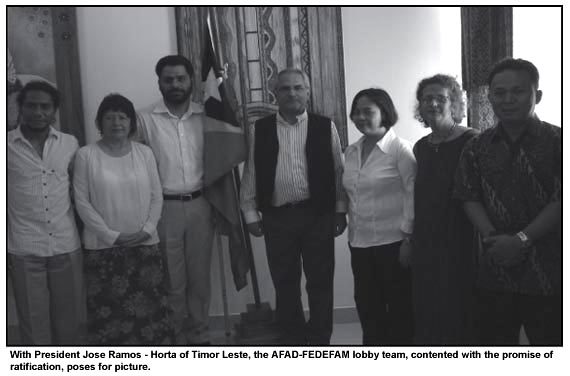
Indonesia
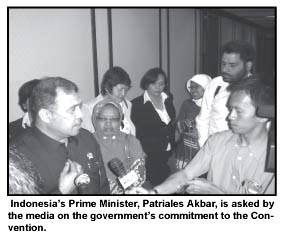 Indonesia’s
seat of government was visited twice, first in September and again in
November. The main reasons for giving priority to Indonesia was that in
2007, the Indonesian delegation promised before the High Level Segment
session of the UN Human Rights Council to sign the Convention. The
second visit was inspired by the Recommendations of the House of
Parliament’s Special Committee6
to inquire into the Disappearance of the 1997-1998 Activists to
re-elected President SBY urging him (among three other points) to ratify
the Convention. While the first visit which included meetings with the
House of Parliament, resulted in the abovementioned recommendations of
the said Commission on Inquiry, the second visit occurred at an unstable
political situation when SBY was shook with a huge scandal involving an
issue of corruption. Hence, what the lobby team received included an
assurance that Indonesia had already ratified sixty-seven international
treaties and an ambivalent promise by the Ministry of Justice to include
the issue in the 2009-2014 Human Rights Action Plan and to raise the
matter to the president’s attention.
Indonesia’s
seat of government was visited twice, first in September and again in
November. The main reasons for giving priority to Indonesia was that in
2007, the Indonesian delegation promised before the High Level Segment
session of the UN Human Rights Council to sign the Convention. The
second visit was inspired by the Recommendations of the House of
Parliament’s Special Committee6
to inquire into the Disappearance of the 1997-1998 Activists to
re-elected President SBY urging him (among three other points) to ratify
the Convention. While the first visit which included meetings with the
House of Parliament, resulted in the abovementioned recommendations of
the said Commission on Inquiry, the second visit occurred at an unstable
political situation when SBY was shook with a huge scandal involving an
issue of corruption. Hence, what the lobby team received included an
assurance that Indonesia had already ratified sixty-seven international
treaties and an ambivalent promise by the Ministry of Justice to include
the issue in the 2009-2014 Human Rights Action Plan and to raise the
matter to the president’s attention.
Timor Leste
"Every family in my country has someone disappeared.
I myself have two brothers who disappeared." These were words of
Nobel Peace Prize Laureate and Timor-Leste Pres. Jose Ramos-Horta in a
meeting with the AFAD, whose local member is HAK Association and
with the FEDEFAM. The president made a clear commitment that he
would undertake all efforts to sign and ratify this international treaty
before the end of 2009. He noted that had he been alerted earlier, the
government of Timor-Leste could have been a state party.
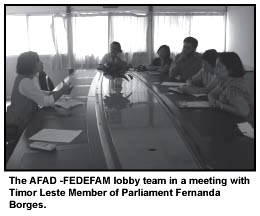 The
team asked the President to facilitate the possibility that Timor-Leste
be one of the first 20 countries to ratify the treaty which provides,
among other things, the right to truth and the right not to be subjected
to enforced disappearances. The AFAD Chairperson, Mugiyanto confirmed
that the Indonesian and the Timor-Leste- governments established a Truth
and Friendship Commission. The joint commission, which recommends the
establishment of a Commission on Disappearances, will be guided by the
treaty, if ratified.
The
team asked the President to facilitate the possibility that Timor-Leste
be one of the first 20 countries to ratify the treaty which provides,
among other things, the right to truth and the right not to be subjected
to enforced disappearances. The AFAD Chairperson, Mugiyanto confirmed
that the Indonesian and the Timor-Leste- governments established a Truth
and Friendship Commission. The joint commission, which recommends the
establishment of a Commission on Disappearances, will be guided by the
treaty, if ratified.
Khurram Parvez of the AFAD memberorganization in
Kashmir greeted Pres. Ramos-Horta with admiration as the latter is
considered as an icon by the Kashmiri people who are fighting for
independence. Looking up to Pres. Ramos-Horta as an exemplary world
leader, Parvez appealed to the president to ratify the treaty and to
appeal to other Nobel Peace Laureates and other Asian heads of state to
endorse the same. Pres. Ramos-Horta assured the group that he would
write to other heads of state and Nobel Peace Prize winners.
Thailand
During the March 2008 session of the UN Human Rights
Council, the Thai government expressed that it was seriously considering
being a party to the Convention. Thus far, nothing had been realized to
fulfil the promise. In a meeting with the Ministry of Justice, the lobby
team, headed by Ms. Angkhana Neelapaijit and her daughter, Pratubjit
Neepalaijit, learned that a process is ongoing to conduct a research on
the possibility of the government to ratify the Convention. However,
possible conflict points in the treaty’s provisions vis-a-vis domestic
laws have prevented the government from fulfilling its promise.
Moreover, insinuations expressed on the issue of justice, such as, for
example in the punishment of perpetrators, were accordingly, major
impediments to the government’s signing the treaty.
The team also conducted a meeting with the
reconstituted members of the Co mission on Human Rights who, being new,
still had to familiarize themselves with the Convention. The
Chairperson, Prof. Amara Pongsapich, Ph.D. assured the AFAD and the
FEDEFAM of the Commission’s support.
India
 In
the historic signing of the Convention in the French Ministry of
Foreign Affairs on 6 February 2007, India had signed the Convention but
thus far, has not yet ratified it. Hence, the AFAD deemed it important
to make a breakthrough by visiting government authorities, especially
the Indian Ministry of Foreign Affairs in order to see possibilities for
ratification. The latter, however, did not give an appointment to the
Federation accordingly because they feared that it would embarrass the
government by mentioning the report on the 2,700 mass graves found in
Kashmir, entitled, "Buried Evidence."
In
the historic signing of the Convention in the French Ministry of
Foreign Affairs on 6 February 2007, India had signed the Convention but
thus far, has not yet ratified it. Hence, the AFAD deemed it important
to make a breakthrough by visiting government authorities, especially
the Indian Ministry of Foreign Affairs in order to see possibilities for
ratification. The latter, however, did not give an appointment to the
Federation accordingly because they feared that it would embarrass the
government by mentioning the report on the 2,700 mass graves found in
Kashmir, entitled, "Buried Evidence."
Nevertheless, the lobby team was able to make full
use of its visit by conducting meetings with parliamentarians, members
of civil society in New Delhi and families of the disappeared in
Kashmir. (See related story, Initial Breakthroughs in India, pp.
53-55) The lobbying resumed at the beginning of 2010 and the lobby
team visited government authorities in Nepal and the Philippines.
Nepal
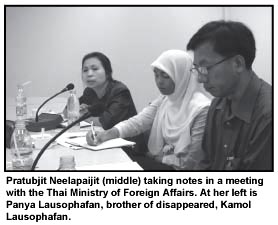 On
25-28 January 2010, the AFAD delegation accompanied by Atty. Gabriella
Citroni, member of the Italian delegation of the then working group for
the drafting of the Convention, called on the interim government of
Nepal to enact the long-awaited antienforced disappearance law and to
sign and ratify the treaty. To note, Nepal submitted the largest number
of cases of disappearances to the UNWGEID in 2004, thus, compelling the
latter to visit the country twice. In a public meeting organized by
Advocacy Forum, the intervention of AFAD was supported by the head of
the Nepali Human Rights Commission, Retired Chief Justice Kedar Nath
Upadhyay. The country’s commitment to be a party to the Convention would
be an important confidence-building measure for the government to
manifest serious commitment in dealing with human rights, a vital issue
to ensure its transition from the violent conflict to peace and
democracy.
On
25-28 January 2010, the AFAD delegation accompanied by Atty. Gabriella
Citroni, member of the Italian delegation of the then working group for
the drafting of the Convention, called on the interim government of
Nepal to enact the long-awaited antienforced disappearance law and to
sign and ratify the treaty. To note, Nepal submitted the largest number
of cases of disappearances to the UNWGEID in 2004, thus, compelling the
latter to visit the country twice. In a public meeting organized by
Advocacy Forum, the intervention of AFAD was supported by the head of
the Nepali Human Rights Commission, Retired Chief Justice Kedar Nath
Upadhyay. The country’s commitment to be a party to the Convention would
be an important confidence-building measure for the government to
manifest serious commitment in dealing with human rights, a vital issue
to ensure its transition from the violent conflict to peace and
democracy.
The ratification of the Convention and the passage of
an anti-disappearance law are important measures the government needs to
undertake to ensure the full implementation of the Comprehensive Peace
Agreement and the 2007 Supreme Court ruling on enforced disappearances.
Philippines
In the heart of Manila, Philippines, at the
Malacanang Palace, Pres. Gloria Macapagal-Arroyo, who is ending her term
in June 2010, promised to certify the fifteen-year old anti-enforced
disappearance bill as urgent and to sign the Convention. The promise was
made at a meeting with officers and members of the FIND and AFAD, held
in the music room of the Malacanang Palace on 14 January 2010.
Joint efforts of AFAD and FIND to follow up the
promise are done in cooperation with Commission on Human Rights
Commissioner Cecilia Rachel Quisumbing. A follow-up letter was sent to
remind the president of her promise while letters to the diplomatic
community in Manila will soon be sent to request them to urge the
Philippine government to sign the Convention without further delay.
During the last six months, series of AFAD-FIND
information dissemination drive to different universities, religious
congregations and urban poor communities in Metro Manila and neighboring
Luzon provinces are conducted in order to make enforced disappearance a
public concern and to get moral, material and political support from the
general public.
Prospects
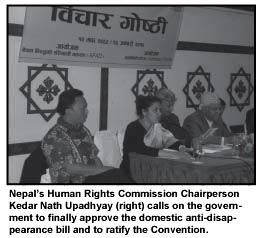 Since
The Netherlands is certain to be the 20th country to ratify the
Convention, the most immediate question now vis-a-vis the Convention is:
Who will be the 19th country? Reviewing the above results of the tour,
the AFAD is optimistic that Timor Leste be the 19th country.
Since
The Netherlands is certain to be the 20th country to ratify the
Convention, the most immediate question now vis-a-vis the Convention is:
Who will be the 19th country? Reviewing the above results of the tour,
the AFAD is optimistic that Timor Leste be the 19th country.
Doing so, it would serve as the champion in Southeast
Asia that would certainly encourage more ratifications in the sub-region
and in the whole of the Asian continent. But regardless of who the next
country to ratify will be, the long-awaited entry into force of the
Convention will be another stage in this long-drawn struggle to attain a
world free from enforced disappearances.
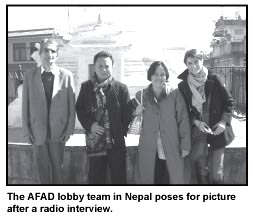 Enforced
disappearances occur in more than 80 countries. More states parties are
necessary to ensure the universal implementation of this treaty, whose
provisions stem from the painful experiences and years of struggle of
the families of the disappeared.
Enforced
disappearances occur in more than 80 countries. More states parties are
necessary to ensure the universal implementation of this treaty, whose
provisions stem from the painful experiences and years of struggle of
the families of the disappeared.
The struggle is long and lonely and the enemies are
strong. Despite this, the inner strength of the advocates for a world
free from enforced disappearances, urged by a love so profound for their
dear desaparecidos, will undoubtedly conquer all the impediments
of truth, justice, redress, reparation and memory.
The Truth shall set us all free!
________________________
UP
MIDDLE
DOWN
1 Ibu is an Indonesian term for Madam.
2 Toti Koto is the mother of Yani
Afri, one of the 13 Indonesian activists who disappeared in 1998 and is
one of the leading family members of IKOHI, the association of
family members of the disappeared in Indonesia.
3 A sari or saree or shari is
a female dress in the Indian Subcontinent. It is a strip of unstitched
cloth ranging from four to nine meters in length that is draped over the
body in various styles. Accessed from http://en.wikipedia.org/wiki/Sari.
4 The Aeta (pronounced as
"eye-ta,"), Agta or Ayta are an indigenous people who live in scattered,
isolated mountainous parts of Luzon, Philippines. They are considered to
be Negritos, who are dark to very dark brown skinned and tend to have
features such as a small stature, small frame, curly to kinky hair with
a higher frequency of naturally lighter hair color (blondism) relative
to the general population, small nose, and dark brown eyes. Accessed
from http://en.wikipedia.org/wiki/Aeta.
5 Kapampangan, also spelled
Capampangan, is one of the major languages of the Philippines. It is
the language spoken in the province of Pampanga, the southern half of
the province of Tarlac, and the northern portion of the province of
Bataan. Kapampangan is also understood in some barrios of Bulacan
and Nueva Ecija and by the Aitas or Aeta of Zambales. Accessed from
http:// en.wikipedia.org/wiki/Kapampangan_people.
6 The recommendations of the Special
Committee includes, 1) The President should establish an Adhoc
Human Rights Court; 2)The President and all government institutions and
other relevant parties should take appropriate steps to immediately
locate the whereabouts of 13 people cited as still missing by Komnas
HAM; 3)The President should facilitate the rehabilitation and
satisfactory compensation to victims and or the families of the
disappeared;4) the Government should immediately ratify the
International Convention for the Protection of All Persons from Enforced
Disappearance.
UP
MIDDLE
DOWN

Mary
Aileen Diez-Bacalso is currently the Secretary- General of the AFAD.
Her most outstanding contribution to the fight against impunity was her
active participation in the three-year drafting and negotiation process
of the UN Convention for the Protection of All Persons from Enforced
Disappearance.